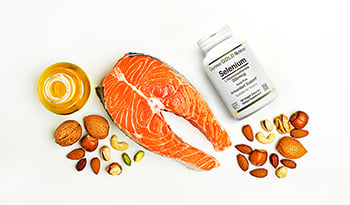A Quick Guide to Selenium
DISCLAIMER:This blog does not intend to provide diagnosis...
- In this article:
- Selenium Provides Antioxidant Support
- Selenium May Prevent Cataract Formation
- Selenium and Heart Disease
- Selenium May Benefit Immune Function
- Selenium Is Important During Pregnancy
- Selenium and Thyroid Function
- Forms of Selenium in Dietary Supplements
- Side Effects

Updated August 2022 / Originally Posted September 2018
The trace mineral selenium functions primarily as a component of the antioxidant enzyme glutathione peroxidase which works with vitamin E in preventing free radical damage to cell membranes. Low levels of selenium have been linked to a higher risk for cancer, cardiovascular disease, inflammatory diseases, and other conditions associated with increased free radical damage, including premature aging and cataract formation.
Selenium Provides Antioxidant Support
Maintaining proper selenium levels appears important in protecting against many health conditions due to its antioxidant effects. Some of the studies show some advantages to selenium-rich yeast in this activity. For example, in one double-blind, placebo-controlled trial, 69 healthy men were given selenium from a selenium-rich yeast called SelenoExcell (200 or 285 μg/day) or selenomethionine (200 μg/day) for nine months. While blood selenium levels increased by 93%, 54%, and 86% in the selenomethionine and low- and high-dose SelenoExcell groups, respectively, only the men receiving the SelenoExcell demonstrated a decrease in standard markers of oxidative damage.1
Selenium May Prevent Cataract Formation
Maintaining proper selenium levels appear to be important in protecting against cataract formation. Studies have shown the selenium content in the human lens with a cataract is only 15% of normal levels, and levels of free radicals are up to 25 times the normal levels in the aqueous humour (eye fluid) in patients with cataracts.2
Selenium and Heart Disease
Selenium appears to offer protection against heart disease and strokes as rates for heart disease are highest, whereas selenium intake is the lowest, although the association is not as strong as it is in cancer. Selenium supplementation has been shown to produce positive effects in preventing heart attacks. In one double-blind study, 81 patients who had a heart attack were randomly assigned to receive 100 mcg of selenium (from selenium-rich yeast) or a placebo. After six months, there were four fatal heart attacks and two non-fatal heart attacks in the placebo group compared with no deaths and one non-fatal heart attack in the selenium group.3
Selenium May Benefit Immune Function
Selenium affects all components of the immune system, including the development and expression of all white blood cells. Selenium deficiency results in depressed immune function, whereas selenium supplementation results in augmentation and/or restoration of immune functions. Selenium deficiency has been shown to inhibit resistance to infection due to impaired white blood cell and thymus function, while selenium supplementation (200 mcg/day) has been shown to stimulate white blood cell and thymus function.4
The ability of selenium supplementation to enhance immune function goes well beyond simply restoring selenium levels in selenium-deficient individuals. For example, in one study selenium supplementation (200 mcg/day) to individuals with normal selenium concentrations in their blood resulted in a 118% increase in the ability of white blood cells to kill tumor cells and 82.3% increase in the activity of a type of white blood cell known as a “natural killer cell” because of its powerful ability to kill cancer cells and microorganisms.5
Selenium Is Important During Pregnancy
There is substantial evidence that selenium is essential for proper fetal growth and development. Selenium requirements appear to be increased during pregnancy as selenium concentrations in the blood tend to be lower during pregnancy, particularly during the later stages. Selenium levels tend to be very low in low birthweight babies.6
Selenium and Thyroid Function
Selenium is essential for the proper function of the thyroid. Low levels of selenium in the thyroid are associated with thyroid dysfunction. To prevent low levels of selenium, the thyroid accumulates, retains, and recycles selenium differently than other tissue. The selenium content in the thyroid is not related to blood selenium levels, and there is no marker yet that reflects thyroid selenium status. Maintaining an adequate dietary intake of selenium appears to be the best way to supply sufficient levels of selenium to the thyroid.7
Forms of Selenium in Dietary Supplements
Popular forms of selenium on the market include sodium selenite, selenomethionine, and yeast-derived selenium. Several studies have shown the inorganic salts like sodium selenite are less effectively absorbed and not as biologically active compared to organic forms of selenium such as selenomethionine and selenium-rich yeast. In addition, several studies have shown advantages with high selenium content yeast (e.g., SelenoExcel), making it the preferred form of selenium supplement.1
The usual dosage recommendation is 50 to 200 mcg per day. At higher intake levels (daily intake above 900 mcg for several months), selenium can produce toxicity.
Side Effects
The human body requires just a small amount of selenium. Dosages as low as 900 mcg per day over prolonged periods may produce signs of selenium toxicity in some people. Signs and symptoms related to chronic toxicity include depression, nervousness, emotional instability, nausea and vomiting, a garlic odor of the breath and sweat, and, in extreme cases, loss of hair and fingernails.
References:
- Richie JP Jr, Das A, Calcagnotto AM, et al. Comparative effects of two different forms of selenium on oxidative stress biomarkers in healthy men: a randomized clinical trial. Cancer Prev Res (Phila). 2014 Aug;7(8):796-804.
- Karakucuk S, Ertugrul Migra G, Faruk Ekinciler O. Selenium concentrations in serum, lens, and aqueous humour of patients with senile cataract. Arch Ophthalmol Scand 1995; 73: 329–332.
- Korpela H, Kumpulainen J, Jussila E, et al. Effect of selenium supplementation after acute myocardial infarction. Res Commun Chem Pathol Pharmacol. 1989 Aug;65(2):249-52.
- Xia X, Zhang X, Liu M, et al. Toward improved human health: efficacy of dietary selenium on immunity at the cellular level. Food Funct. 2021;12(3):976-989.
- Kiremidjian-Schumacher L, Roy M, Wishe HI, et al. Supplementation with selenium and human immune cell functions. II. Effect on cytotoxic lymphocytes and natural killer cells. Biol Trace Elem Res 1994;41:115-127.
- Hogan C, Perkins AV. Selenoproteins in the Human Placenta: How Essential Is Selenium to a Healthy Start to Life?. Nutrients. 2022;14(3):628.
- Gorini F, Sabatino L, Pingitore A, Vassalle C. Selenium: An Element of Life Essential for Thyroid Function. Molecules. 2021;26(23):7084.

 By Dr. Michael Murray, N.D.
By Dr. Michael Murray, N.D. 


